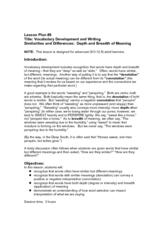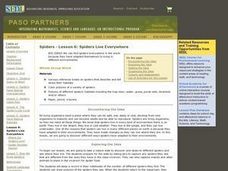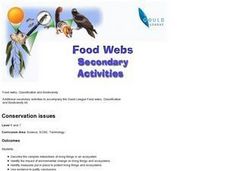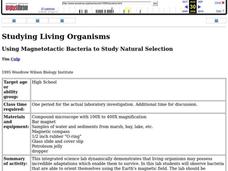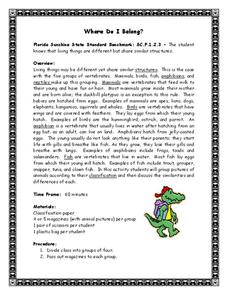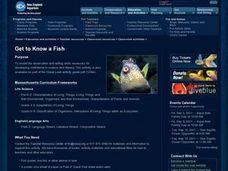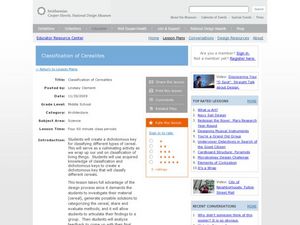Curated OER
Solving Math Problems In the Real World
Upper elementary and middles schoolers discuss and solve real world applications of math. They use formulas for volume and percents to answer real world questions. In the second part of the lesson, groups write and solve word problems....
Curated OER
Interpreting Data from Birdfeeders
What kinds of birds live in your area? Read a book about birds to your learners and explore their feeding patterns. Charts and graphs are provided in this three page packet, but consider assigning the basic questions if using with young...
Curated OER
Vocabulary Development and Writing
Engage pupils in practicing denotative and connotative strategies to understand particular words. They work in pairs and write a series of sentences using each word that has a positive connotation and negative connotation. Some example...
Denver Art Museum
The Poetry in Non-Events
The photograph, Nellie and her Italian Soda is viewed and discussed by the class. They are instructed to use the photograph as inspiration to write a poem about non-events, or things that are beautiful in every day life. Pupils use a...
Curated OER
Find the Facts
Second graders identify characteristics of living organisms and nonliving objects while running on the playground. They run to retrieve a card, determine whether to place it in the "living" container or the "nonliving" container.
Curated OER
Conservation Issues
Students discover the relationship among living things in an ecosystem. They identify the impact of environmental changes on animals and how to protect them. They work together to create an informational brochure.
Curated OER
Adaptation Scavenger Hunt
Fourth graders recognize the specific adaptations of living things and relate them to survival within the animals environment. They study common plants and animals found in Utah environments and how they have adapted to the environment...
Curated OER
Ecosystem Organization - Lesson Plan
Student explore ecosystems. In this ecosystem organization lesson, pupils consider how scientists study living organisms. Students participate in a teacher guided activity that requires them to visualize an organism and imagine its place...
Curated OER
Variations
Sttudents examine populations of living things and identify variations in physical features.
Curated OER
Surveying an Environment / Ecosystem
Young scholars visit a local ecosystem to survey the plants and animals present and identify interactions between organisms. They identify interactions that occur between living organisms and their ecosystem and present their ecosystem...
Curated OER
Explore Zone
In this food chain worksheet, students go outside to observe a small patch of grassy are. They list as many living and non-living things they can see then complete 5 short answer questions about their list.
Curated OER
Enzymes in Action: An Inquiry Approach to the Effects of Enzymes
Students experiment with enzymes as key components of chemical reactions in all living things through this series of lessons.
Curated OER
The Case of the Disappearing Frogs
Students complete an Internet based activity to investigate the case of the disappearing tadpoles. They discover the interrelationship of living things.
Curated OER
Using Magnetotactic Bacteria to Study Natural Selection
Students demonstrate that living organisms may possess incredible adaptations which enable them to survive. They observe bacteria that are able to orient themselves using the Earth's magnetic field and formulate a hypothesis as to how...
Curated OER
Birth, Growth, And Development
Students understand that all living things have a life cycle that includes being born, developing into an adult, reproducing, and eventually dying.
Curated OER
You Belong in the Zoo Project - Using HyperStudio
Learners explore the diversity of living organisms. They research an animal found in the zoo and plans a 10-card HyperStudio project about his/her organism.
Curated OER
Population Growth
Students investigate the biodiversity of living things and how they are interdependent upon each other. They conduct research using a variety of resources. Specifically students create a graph to show how a population can grow in an...
Curated OER
Bacteria: The good, the bad, the ugly
Seventh graders conduct an experiment. In this bacteria lesson plan, 7th graders list living and nonliving things and brainstorm the characteristics they share. Students are divided into two groups where they put samples of hand soap...
Curated OER
Elevation, Plants and Animals
Students determine whether elevation is one of the things that affect where and how plants and animals live. They read plant and animal physical descriptions and determine the environment where the animal might live.
Curated OER
Where Do I Belong?
Fourth graders work in groups. They are given magazines. Students cut pictures of five mamals, five birds, five reptiles, five amphibians, and five fish. They place the pictures in a plastic bag. Students switch bags. They are explained...
Curated OER
Get to Know a Fish
Students discover the anatomy of a fish by identifying its body parts. In this oceanography lesson, students view a live fish in their classroom and draw a poster of the fish one body part at a time while identifying it. Students...
Curated OER
Classification of Cerealites
Students create a dichotomous key. In this categorizing lesson, students create a dichotomous key for different types of cereal. Students classify the cereal into groups such as flakes and cereal with holes. Students discuss their...
Curated OER
Introduction to Classification
Fourth graders design a classification system to categorize animate and inanimate objects. They discuss the advantages of grouping things as they classify buttons, leaves, shells.




